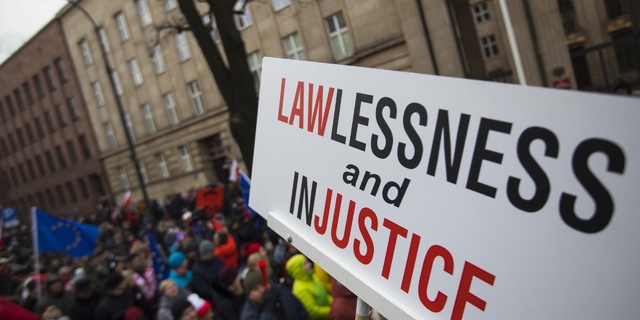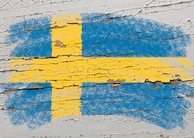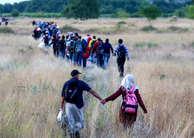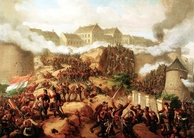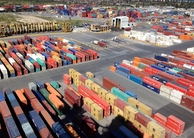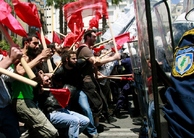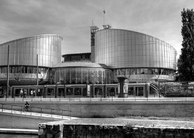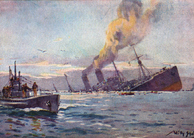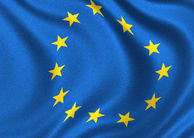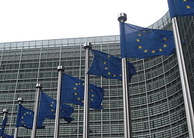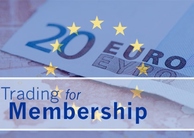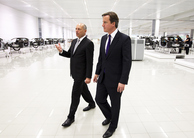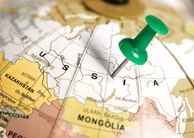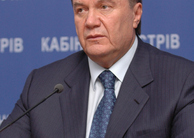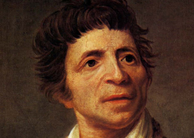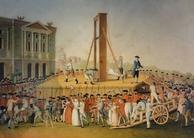|
Europe (tagged articles)
The keyword Europe is tagged in the following 50 articles.
2022, Vol. 14 No. 02
The causes of the First World War remains a historiographical topic of contention more than 100 years on from the start of the conflict. With the passing of the centenary in 2014, a new wave of publications has expanded the scope and depth of historians... Read Article »
2018, Vol. 10 No. 10
After joining the European Union (EU) and the North Atlantic Treaty Organization (NATO) in 2004, Estonians felt secure and in charge of their future. However, following the 2007 Bronze Horseman incident in the Estonian capital of Tallinn which included... Read Article »
2018, Vol. 10 No. 07
The Polish populist Law and Justice Party (PiS) overturned the mainstream consensus in Polish politics by returning to power in 2015 with a populist platform, decrying a selfish elite and advancing policies that critics saw as illiberal and authoritarian... Read Article »
2017, Vol. 9 No. 10
Chocolate is a foodstuff that many people in the modern world take for granted; the sweet treat can today be found plentifully and cheaply in practically any store all across the globe, especially in the Euro-American world. Despite its commonplace... Read Article »
2017, Vol. 9 No. 06
Similarly to many European countries, the Swedish population often perceive their history as an epoch of homogeneity: a time when every Swedish citizen was believed to have had the same ethnic phenotype, spoken the same language, believed in the... Read Article »
2016, Vol. 2015/2016 No. 3
When Britain and France signed what became known as the ‘Entente Cordiale' in 1904, it brought into being an era of mutual cooperation between two neighbours whose past had often made them the best of enemies. The partnership served and survived... Read Article »
2016, Vol. 8 No. 07
As Europe’s frontier with the Muslim East, Greece has been cast as backward, and not worthy of full sovereignty since the earliest years of its independence from the Ottoman empire. Greece's contradictory position as guardian of the origins... Read Article »
2016, Vol. 8 No. 05
There have been plenty of greater revolutions in the history of the modern world, and certainly plenty of more successful ones. Yet there has been none which spread more rapidly and widely, running like a bushfire across frontiers, countries and... Read Article »
2015, Vol. 6 No. 1
This paper investigates the relationship between various types of economic freedom and intra-EMU export growth. Export growth is the primary empirical puzzle that this paper seeks to explicate, and is important because the EMU's inception preceded... Read Article »
2015, Vol. 7 No. 07
This study looks at populist movements in Greece that formed in reaction to the failures of elite statist politicians. Beginning with the 2008 student uprisings in Athens, this narrative follows the escalation of social and political activism as... Read Article »
2015, Vol. 7 No. 06
In his work The Idea of History, philosopher and historian Robin Collingwood outlines the development of historiography by leading his audience on a European cross-continental journey through time. He identifies the early modern period as a point... Read Article »
2014, Vol. 6 No. 11
Human rights protection in Europe evolved significantly over the last century, culminating in the creation of the European Court of Human Rights. Unfortunately, the decisions made by the European Court of Human Rights are not binding and do not... Read Article »
2014, Vol. 8 No. 1
What are the prospects for European Union accession in Bosnia, a country with a legacy of ethnic conflict and malfunctioning democracy? How might the accession of Croatia to the European Union affect this process? This paper analyses the current... Read Article »
2014, Vol. 6 No. 10
In July 2012, Spain's unemployment rate was above 20%, its stock market was at its lowest point in a decade, and the government was borrowing at a rate of 7.6%. With domestic demand depleted and no sign of recovery in sight, President Mariano Rajoy... Read Article »
2014, Vol. 6 No. 06
The First World War is largely thought of as a conflict where the majority of the significant operations took place almost exclusively on mainland Europe with the exception of a handful of naval clashes fought throughout the world's oceans. This... Read Article »
2014, Vol. 1 No. 1
A European single market for electricity is modeled to find the optimal portfolio of energy generation technologies in the presence of a carbon tax. The goal is to find the Pareto optimal carbon tax rate such that both carbon emissions and production... Read Article »
2014, Vol. 6 No. 04
The European legal system has been considered as either an intergovernmental legal system or a supranational one. The intergovernmental order, on the one hand, emphasises that the European Court of Justice should consider the preferences of member... Read Article »
2014, Vol. 2013/2014 No. 1
Today political philosophy is generally conducted in the light of the perceived triumph of liberalism. That is, it typically proceeds from the assumption that it is unreasonable, if not irrational or pathological, to resist liberalism whether as... Read Article »
2014, Vol. 2013/2014 No. 1
The recent economic crisis roved to be immensely threatening to the economic equilibrium within the European Union (EU). Beginning in the United States, it then proved its "domino effect" by covering the EU, resulting in so-called 'financial stress... Read Article »
2013, Vol. 7 No. 1
The current state of European strategic cooperation is optimistically described as "splintered" and pessimistically labeled as "nonexistent" by politicians and pundits alike. A potential retreat of the EU to staunch intergovernmentalism frustrates... Read Article »
2013, Vol. 7 No. 1
In Greece's parliamentary elections of June 2012, a far-right neo-fascist party called Golden Dawn gained eighteen seats, making them the third most popular political party in parliament. An opinion poll published in October by KAPA Research Center... Read Article »
2013, Vol. 5 No. 10
This article highlights the European Commission’s role within the European Union (EU), which has been weakened over time. Through this essay various aspects of the Commission’s power in relation to the structure and procedures of comitology... Read Article »
2013, Vol. 5 No. 09
The quest for economic supremacy has been at the heart of the European integration process since its very inception. Tracing the historical origins of the economic progress agenda, Europe’s ambition to bolster its economy vis-à-vis... Read Article »
2013, Vol. 5 No. 06
Within a short span of time, immigration has become one of the major issues in the field of European politics and social discourse questioning the status quo of such conceptions as citizenship, nationhood and community cohesion. Migration within... Read Article »
2012, Vol. 2 No. 1
In the 1960s because of a stagnant economy, the Federal Republic of Germany (hereinafter as West Germany) invited Turks to Germany to work as "guest workers" (Legge 2003, 142). They were to work there for two years and then return to their homeland... Read Article »
2012, Vol. 2 No. 1
The subject of European legal integration entered the spotlight of interdisciplinary studies in the mid-1990s and has continued to maintain, if not increase, its prominence in scholarly literature (Mattli and Slaughter, 1998, 177-178). As Egan,... Read Article »
2012, Vol. 4 No. 05
Is European Citizenship merely a mechanism for a deepening financial integration of the European Union? Or is there a deeper meaning and a deeper reasoning for the development of the concept of European Union Citizenship into an all-encompassing... Read Article »
2012, Vol. 4 No. 03
In the waking moments of the twenty-first century, political science faces a burgeoning global movement, a crisis in some eyes, and a revolution in others. News and media hype over worldwide protests, from the Middle East, to Africa, to the United... Read Article »
2012, Vol. 4 No. 01
Does candidacy to the European Union (EU) increase a nation’s Trade Openness? A good way to begin examining this question is by asking, what is Trade Openness? Simply put, it is a nation’s imports plus its exports divided by its GDP ([... Read Article »
2012, Vol. 2011/2012 No. 2
This essay will analyse the on-going events in the Eurozone single currency area. It will look at the current sovereign debt crisis, most obviously manifested in Greece, Portugal and Ireland, and try to envisage how it will change the future course... Read Article »
2012, Vol. 2011/2012 No. 2
In spite of the above-described traditional sentiment that the European Union (EU) was primarily an economic actor, with all other priorities seconded to that fact, trade policy has been inextricably linked with the EU’s international presence... Read Article »
2011, Vol. 3 No. 09
Of the European Union’s twenty-seven member states, no country is more sceptical of political and economic integration than Great Britain. The English are profoundly independent and inherently suspicious of their continental neighbours; an... Read Article »
2011, Vol. 2011/2012 No. 1
It was commonplace among academics of the 1970s to share an understanding of the frozen nature of international relations during the Cold War period, and to hold similar assumptions about the fixed character of the nation-state and the importance... Read Article »
2011, Vol. 2011/2012 No. 1
Among European states in the aftermath of the Second World War, multilateral cooperation was seen as a long term stabilisation for peace. The European Union (EU), since its establishment in 1957 as the European Coal and Steel Community with six... Read Article »
2011, Vol. 2011/2012 No. 1
The Treaty of Lisbon1 has had effects on the workings of the European Union, and has significant implications both for how it functions through its provisions on governance and decision-making and on how the union develops. Lisbon has political... Read Article »
2011, Vol. 2011/2012 No. 1
To say the recent few years have not been the EU’s brightest would certainly be an understatement. There is so much eclecticism, topic deviation and “eurospeak” that one could forget what the EU really stands for. Just the list... Read Article »
2011, Vol. 2011/2012 No. 1
The Economic Monetary Union (EMU) is the end point of an ambitious and historic stage of integrated market changes1 that not only challenge the structure and foundation of modern-day liberal capitalism, but also offer – where successful &ndash... Read Article »
2011, Vol. 2011/2012 No. 1
“In God We Trust” - the motto that inspired a nation built on the paradox ‘out of many, one’ could be construed as the wish for ‘divine goodness and order in the universe’.1 It entails the full recognition of... Read Article »
2011, Vol. 2011/2012 No. 1
The first decade of the twenty-first century was a period of change for Russia. The crisis of the 1990s was/were overcome and its international posture has improved. However, the scope and the stability of the shift are debatable and there is no... Read Article »
2011, Vol. 3 No. 04
This case study asks the following question: given the symbol of the European Union as the ultimate supranational, rights-based, compliance-inducing international organization, why have member states France and Italy escaped punishment for their... Read Article »
2011, Vol. 2010/2011 No. 1
The European Union (EU) is rarely seen as a powerful actor on the international relations stage. A statecentric, ‘high politics’ view of global politics tends to overlook the involvement of the EU and its effectiveness, 2 and the dominance... Read Article »
2010, Vol. 4 No. 1
The initial 100 days of Viktor Yanukovych’s presidency appeared to be a complete departure from the Yushchenko presidency. While publicly reiterating his commitment to integration with the European Union and supporting transparency, freedom... Read Article »
2010, Vol. 2 No. 01
Jean-Paul Marat, notorious for his inspiring yet aggressive publications during the French Revolution, was one of the most influential characters of the late 18th century. Indeed, his radical publications helped induce the violent manner of the... Read Article »
2010, Vol. 2 No. 01
The French Revolution marks a stain in history, notorious for one of the bloodiest periods in modern civilization. Whether this infamous violence existed at the birth of the Revolution or only during the Terror has been the topic of debate between... Read Article »
2010, Vol. 2009/2010 No. 1
“But you can’t grow,” answered the Fairy. “Why not?” “Because Marionettes never grow. They are born Marionettes, they live Marionettes, and they die Marionettes.” “Oh, I’m tired of always being... Read Article »
2007, Vol. 1 No. 1
Fifteen years ago, the collapse of the bipolar world overwhelmed the installed world order. The USA became the only superpower standing and leading the world organization. They have now to deal with emerging countries such as China and India. On... Read Article »
2007, Vol. 1 No. 1
In Washington as in Peking, in Beirut as in Bamako, the question is asked of us: what is the European Union’s (EU) foreign policy? In Lisbon on October 18th, the 27 member states agreed to a first response on means and tools. With the creation... Read Article »
1999, Vol. 1998/1999 No. 1
When Great Britain joined the European Union in 1973 (then referred to as the European Community) many expected the British common Law system to clash with the European Law system, which is mainly based on its continental predecessors, in particular... Read Article »
1997, Vol. 1996/1997 No. 1
It is a paradox of modern day politics that an issue of such immense constitutional and practical significance to the future of Britain as that of further European integration, which excites such great activity amongst politicians, should be... Read Article »
1997, Vol. 1996/1997 No. 1
The aim of this article is to assess the role of the Organisation of Security and Co-operation in Europe (OSCE) in the post-Cold War era. The paper will firstly give a brief outline of the development of the Conference on Security and Co-operation... Read Article »
Expedited Article Review
Submit an article and get a decision fast.
If you need a fast decision, INQUIRIES Journal offers expedited processing of your submission for a small fee. Depending on the expedited review option you choose, you can receive a decision in as few as 5-days.
In addition to a shorter review period, the fee supports the journal's continued operation and open-access publishing model. Standard submissions are always free. Submit Now » - Submit an Article to Inquiries Journal -
|



